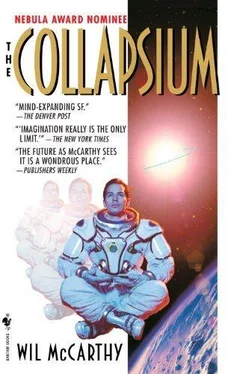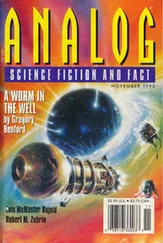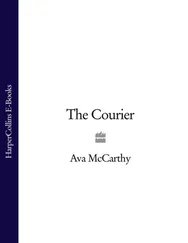“I’ll make this as quick as light speed permits,” Tamra said tartly to the assembled millions, when the chain reaction had finally subsided. “De Towaji has business elsewhere, and doubtless we’ve taken enough of his time already. Declarant Sykes, do you have the medal?”
“I do,” Marlon said, stepping forward, a bronze-colored disc in his outstretched hand, trailing a loop of ribbon.
Tamra lifted it, took the ribbon in both hands, and said, “Declarant-Philander Bruno de Towaji, it is my privilege as monarch of this Queendom to present you with an honor devised specifically for this occasion: the Medal of Salvation. It has no special properties, save the love and gratitude which inspire it.”
Grudgingly, Bruno lowered his head and permitted her to loop the ribbon around his neck. She let the medal fall, so that when he stood up straight again it rested just over his heart.
“As the voice of all humanity, it is my privilege to say to you, ‘Thanks, Bruno. We owe you one.’ ”
It was Bruno’s turn to laugh, the Queendom’s millions falling in behind him, less deafening than before. To the crowds Tamra said, “Actually, that’s it. Thank you all for coming.”
And then, to Bruno’s relief, the holie sceens began winking out, the igloo unbuilding itself around the three of them. Half an hour later, the last of the crowds had vanished, leaving only the Ring Collapsiter itself to observe them.
“Leave us, please,” Her Majesty said to Marlon Sykes.
“Gladly,” he replied, walking to the fax, casting Bruno a pointed look before vanishing into it.
“So,” she said.
“So,” Bruno agreed.
“We’ve quarreled.”
“Indeed.”
“But we’re okay now. Friends again?”
He shrugged. “We always were.”
“Really,” she said, seeming to find that funny. She took his arm, and led him in the direction Marlon had gone. “Will it be another decade before I see you next? Longer, perhaps?”
Bruno shrugged. “I have no way of knowing, Majesty. My work is intricate.”
“Stow the formality, jerk. I’ve missed you.”
“I’ve missed you, too. Did you think otherwise?”
“But you don’t miss… this.” She gestured, somehow indicating the whole of the Queendom.
Startled, he replied. “Who said I didn’t miss it? Of course I do! Not all of it, but enough. I miss the smell of bread on a rainy street. I miss the laughter of children. Not court, of course. Not fortune or fame. Civilization demands things of me which I really don’t know how to provide. Perhaps I’ll learn someday, or people will stop asking, but for the moment I find it much simpler to be alone with my work.”
“Simpler, perhaps. But are you happier?”
He stopped walking for a moment to think about that, and finally decided he didn’t have an answer.
“You may kiss me good-bye,” she said, stopping beside him, turning her face up toward his.
On either side of them, her robots tensed slightly.
Ignoring them, he bent and kissed her, reflecting that this, at least, he treasured from his old life. This, at least, he could always treasure. How many knew the softness of her lips? How many Philanders could a Virgin Queen declare? Precious few.
“Good-bye, Tarn,” he said, with unintended gruffness. And then, more softly, “I shouldn’t think it’s forever.”
And then he stepped through the fax gate, into the little spaceship she’d parked on his lawn.
Home again.
He took a moment to admire the ship’s red velvet interior, its burnished silver fittings and leather seats, superfluous since Tamra had no need to actually ride in this thing. But he supposed the ship would look strange without them. He drew a breath, then stepped out toward the little debarkation staircase and descended to his meadow below.
His sky was a much deeper blue than Earth’s, and much clearer than Venus‘. The little clouds drifting through it seemed like toys; the horizon was so very close. Behind him, the little teardrop-shaped spaceship closed its hatch and began to hum as if warning him of impending liftoff. Very well. He strode purposefully toward his tiny house. His cottage, really.
“Door,” he said when he was close enough. Obligingly, the house opened up, and he entered. All was still neat and tidy and gaudily chandeliered from Tamra’s too-brief visit. Robots lined up in front of him, forming a corridor, bowing in twin waves as he passed.
“Stop it,” he ordered, refusing at least to put up with that sort of thing in his own home. “Unseal the bedroom,” he said after another moment.
Again, the house obliged immediately, but still Bruno looked around him, frowning, dissatisfied.
Outside, Tamra’s spaceship lifted silently from the ground, hurling a shadow at the horizon and then vanishing into the sky. Still, Bruno frowned.
“Is anything wrong, sir?” the house finally asked.
Bruno grunted, then threw himself down on the sofa and grudgingly shook his head. “No, it’s fine; everything’s fine. It just looks smaller, that’s all.”
Every known tradition of human folklore includes references to “ghosts,” lingering traces of people and events long past, and particularly to hauntings, the infusion of certain places with ghostly happenings. Such places are usually man-made, usually built of stone, and the images captured therein are typically unpleasant in character and almost always described in frightening terms regardless of content. A ghost is, to a first approximation, a multimedia record of human terror or anguish, impressed in cut stone and released gradually over time.
In the early ages of rationalism, even through the beginnings of space flight, disbelief in such phenomena was considered a fashionable — even obligatory — rejection of primitive and outmoded superstition. This despite the almost universal dread inspired by graveyards and mausoleums and ruined castles, most particularly at night, when their thermal infrared emissions stood out most prominently. This despite the discovery of semiconductors, the invention of cameras whose silicon-oxide lenses channeled images onto arrays of silicon detectors and thence to silicon memories, from which they could be viewed through silicon-based video displays .
Any rock is 99.999% computationally inert, yes, but particularly in iron-rich basalts and granites, most particularly in those that have been shaped with metal tools — which of course tend to become magnetized with frequent use — chance doping of conveniently sized pockets or vacuoles yields electrical properties ideal for the capture and storage of patterned radiation, such as the image of a body flushed with fear or rage. That the inventors of magnetic tape and bubble memory failed to recognize this is often cited, as one of history’s stranger anomalies .
Granted, it often takes quite sophisticated archaeological instruments to extract the information again, to reconstitute some recognizable echo of the image itself. It’s difficult to imagine that human sensory processors can distinguish so finely, and filter so well. Unaided ghost “sightings” remain rare and difficult to confirm, leading perhaps to the conclusion that they don’t really occur. But it pays to remember that ancient folklorists — the well-nourished ones, at least — were as intelligent and reliable as any modern witness, and also that they knew, one way or another, not only about hauntings but about the vanished “dragons” and “oni” and “troglodytes” of ages past .
At any rate, modern archaeologists make a livelihood of studying ghosts virtually indistinguishable from those described by medieval scholars. It’s from just such a source that we know the following:
Читать дальше












